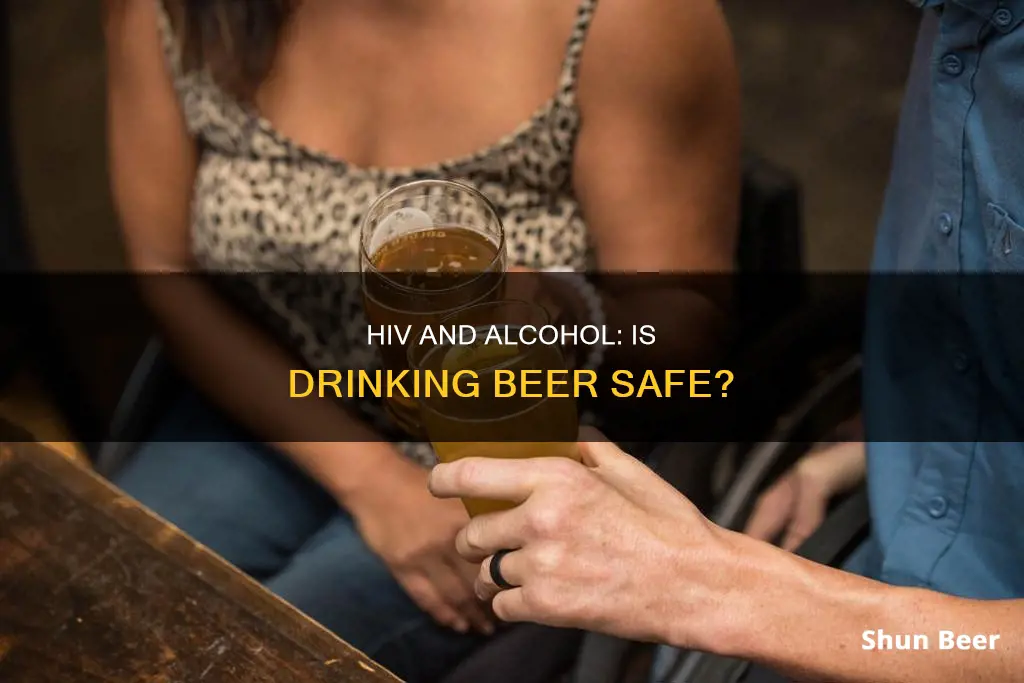
Alcohol is a drug that can be consumed in many forms, including beer, and is often enjoyed by people worldwide. However, for individuals living with HIV, the combination of alcohol and HIV can have adverse effects on both the body and behaviour. While moderate alcohol consumption is generally considered acceptable for most people, including those with HIV, excessive drinking can lead to negative consequences. Drinking alcohol in large quantities can weaken the immune system, damage the liver, and increase the likelihood of risky behaviours that may result in HIV transmission or acquisition. Therefore, it is essential for HIV patients to understand the potential risks associated with alcohol consumption and to make informed decisions regarding their health and well-being.
| Characteristics | Values |
|---|---|
| Alcohol consumption for HIV patients | No established "safe" level of alcohol consumption for HIV patients |
| Alcohol's effect on HIV patients | Weakened immune system, liver damage, impaired decision-making, negative psychological effects |
| Recommendations for HIV patients | Drink in moderation, don't have sex if drunk, seek help for alcohol abuse |
What You'll Learn
- Excessive drinking can damage the liver, which is vital for processing HIV drugs
- Alcohol can cause risky behaviour, increasing the chance of getting HIV or passing it on
- Drinking can impair decision-making, such as forgetting to take HIV medication
- Alcohol can negatively impact the mental health of HIV patients
- Drinking can weaken the immune system, making it harder to fight infections

Excessive drinking can damage the liver, which is vital for processing HIV drugs
Alcohol can be harmful to the liver, and excessive drinking can cause liver damage. The liver is a vital organ that plays a crucial role in filtering blood, removing toxins, producing bile, and breaking down food. When it comes to individuals with HIV, maintaining a healthy liver is of utmost importance as the liver is essential for processing HIV medications.
Excessive alcohol consumption can lead to long-term health issues, including liver damage. Drinking excessively can cause permanent scarring of the liver, impairing its ability to function properly. For individuals with HIV, this can be particularly detrimental as the liver is responsible for metabolising HIV medications. Therefore, excessive drinking can impact the effectiveness of HIV drugs and increase the likelihood of experiencing side effects.
It is recommended that individuals with HIV adhere to the guidelines for moderate drinking, which is up to 1 drink per day for women and up to 2 drinks per day for men. Binge drinking, or consuming a large amount of alcohol in a single session, is especially harmful and can lead to poor coordination, vomiting, emotional distress, memory loss, heart problems, and even alcohol poisoning.
Additionally, alcohol use can impact an individual's ability to take their HIV medications consistently and correctly. Studies have shown that people with HIV who engage in binge drinking are more likely to miss doses of their treatment. Furthermore, alcohol can cause vomiting, and if an individual vomits within an hour of taking their HIV medication, they may need to retake the dose.
It is important to note that alcohol use can also interact with other medications and increase the risk of side effects. Therefore, it is crucial for individuals with HIV to discuss their alcohol consumption with their healthcare provider to ensure the safe and effective use of their medications.
Beer and Low-Fiber Diets: What You Need to Know
You may want to see also

Alcohol can cause risky behaviour, increasing the chance of getting HIV or passing it on
Alcohol can impair your judgement and make it difficult to think clearly, increasing the likelihood of engaging in risky behaviour that can put you at risk of contracting or transmitting HIV. Here are some ways in which alcohol can lead to risky behaviour:
- Impaired judgement and reduced inhibitions: Alcohol can impair your ability to make informed decisions and negotiate safer sex practices, such as condom use. It lowers your inhibitions, making you more likely to engage in risky sexual behaviours.
- Increased sexual partners and drug use: Alcohol consumption is associated with having multiple sexual partners and using other drugs, both of which increase your risk of exposure to HIV and other sexually transmitted infections.
- Difficulty using condoms: Alcohol can make it harder to use condoms correctly, increasing the risk of HIV transmission during sexual intercourse.
- Binge drinking: Binge drinking, or consuming large amounts of alcohol in a short period, can lead to loss of control and cloud your judgement, increasing the likelihood of engaging in unprotected sex or other risky behaviours.
To reduce the risk of HIV transmission, it is important to drink in moderation, avoid sex while under the influence, and consistently use prevention methods such as PrEP or condoms. Additionally, seeking help for alcohol misuse or dependence is crucial to minimise the harmful effects of alcohol on your health and HIV management.
Beer and Guns: Can You Drink and Carry?
You may want to see also

Drinking can impair decision-making, such as forgetting to take HIV medication
Drinking alcohol can impair decision-making, and this can lead to HIV patients forgetting to take their medication. Alcohol affects the brain, making it difficult to think clearly and potentially leading to poor decisions that increase the risk of HIV transmission. For instance, an HIV patient may be more likely to engage in unprotected sex or have sex without taking their medication when drunk.
Additionally, drinking alcohol can make it challenging for HIV patients to adhere to their medication regimens. Alcohol can cause vomiting, and if an HIV patient vomits within an hour of taking their medication, they must retake the dose. Retaking doses can be challenging if the patient is drunk and their decision-making abilities are impaired.
The negative impact of alcohol on the liver is another concern for HIV patients. The liver plays a crucial role in processing anti-HIV drugs, and alcohol abuse can damage it. If the liver is not functioning optimally due to alcohol consumption, it may be less effective at eliminating waste from medications, leading to potential side effects.
Furthermore, alcohol can negatively affect the immune system, which is already weakened in HIV patients. A weakened immune system increases the likelihood of experiencing side effects from HIV medications and makes it harder for the body to fight off common and HIV-related infections.
Overall, while occasional social drinking may not be harmful for HIV patients, excessive alcohol consumption can impair decision-making and lead to forgotten medication doses. It can also negatively impact the liver and immune system, making it more challenging for HIV patients to manage their condition effectively. Therefore, HIV patients should drink in moderation or abstain from alcohol to ensure optimal health outcomes.
Beer Taxes: Effective or Just a Burden?
You may want to see also

Alcohol can negatively impact the mental health of HIV patients
Alcohol can have a detrimental impact on the mental health of HIV patients. Alcohol is a depressive drug and can cause or worsen mental, psychological, or emotional problems. HIV patients may be dealing with a significant amount of emotional distress, and while alcohol can provide temporary relief, it can also alter mood and lead to further physical, psychological, and social problems.
A study by Yale University found that HIV-positive individuals reported feeling more "drunk" with less alcohol than those without HIV. The study also found that HIV patients who drank were more likely to forget to take their medication. This suggests that HIV infection makes the brain particularly vulnerable to alcohol's effects, and consistent alcohol use can cause significant damage. The areas of the brain most affected by alcohol use are those responsible for short-term memory, fast mental processes, movement, and decision-making.
Alcohol can also negatively impact the progression of HIV, both physically and behaviourally. There are no established "safe" levels of alcohol use for HIV-positive individuals, and consumption should be limited as much as possible. Alcohol use can weaken the immune system, damage the liver, and lead to risky behaviours that increase the chance of getting HIV or passing it on.
Additionally, alcohol use can impair decision-making abilities. For example, an HIV-positive individual who has been drinking may be more likely to engage in unprotected sex or forget to inform their partner about their HIV status. Alcohol use can also make it difficult for individuals to take their medications correctly, as it can increase the likelihood of missing doses.
If heavy alcohol use prevents HIV patients from effectively adhering to their antiretroviral regimens, it can have potential consequences for both their health and the health of their sexual partners. Current research indicates that effective HIV treatment also reduces the risk of transmission, as a lower viral load means a lower likelihood of passing the virus on to others through unprotected sex.
Therefore, it is essential for HIV patients to be aware of the negative impact of alcohol on their mental health and overall well-being and to seek support if needed.
Wine and Beer: Mixing Alcoholic Drinks, Safe or Not?
You may want to see also

Drinking can weaken the immune system, making it harder to fight infections
Drinking alcohol can weaken the immune system, making it harder to fight infections. This is true for everyone, but the effects are more pronounced for people with HIV. When a person has HIV, their immune system is already weakened, and drinking alcohol can make it even more difficult for their body to fight off common infections like a cold or the flu. This is because alcohol can slow down the body's ability to recover from infections.
Additionally, alcohol can negatively impact the liver, which plays a vital role in processing anti-HIV drugs. Heavy drinking can cause liver damage and increase the risk of serious health conditions, including liver disease, hepatitis, and high cholesterol. For people with HIV, even small amounts of alcohol can speed up liver damage, especially if they also have hepatitis B or C.
Drinking alcohol can also impair decision-making abilities, which may lead to risky behaviours that increase the chance of getting HIV or transmitting it to others. For example, an HIV-positive individual who has been drinking may be more likely to engage in unprotected sex or forget to take their medications.
Research has shown that people with HIV who regularly consume alcohol tend to have a higher viral load and lower overall CD4 count, indicating a weaker immune system. Alcohol use can also lead to negative psychological effects, such as intensifying feelings of isolation and even leading to suicidal thoughts.
While moderate alcohol consumption may not be harmful for people with HIV, excessive drinking can have serious negative consequences for their health and well-being. It is important for individuals with HIV to be aware of the risks associated with alcohol consumption and to make informed decisions about their drinking habits.
Beer and Colon Cancer: Is There a Link?
You may want to see also
Frequently asked questions
HIV patients can drink beer, but it is recommended to do so in moderation. Excessive alcohol consumption can negatively impact the health of HIV patients and affect their ability to stick to their HIV treatment.
Drinking beer, especially in large amounts, can weaken the immune system of an HIV patient, making it harder for them to fight off common infections and HIV-related infections. It can also increase the likelihood of experiencing side effects from HIV medications. Additionally, alcohol can have negative effects on the liver, which plays a crucial role in processing anti-HIV drugs.
HIV patients should follow the general guidelines for alcohol consumption, such as drinking in moderation and avoiding binge drinking. It is recommended to limit alcohol consumption to no more than 14 units per week for both men and women. One unit of alcohol is roughly equivalent to a third of a pint of beer.
Alcohol does not interfere with the effectiveness of HIV medications. However, excessive alcohol consumption can lead to missed doses of HIV treatment. Additionally, alcohol can interact negatively with certain other medications, so it is important to consult a healthcare professional or pharmacist before consuming alcohol with any prescribed medications.







